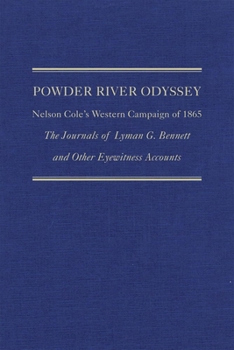Powder River Odyssey: Nelson Cole's Western Campaign of 1865, the Journals of Lyman G. Bennett and Other Eyewitness Accounts
The entry for September 8, 1865, is terse: "We marched and fought over 15 miles today." With these few words civilian military engineer Lyman G. Bennett characterized the experience of the 1,400 men of the Powder River Expedition's Eastern Division as they trudged through largely unexplored territory and faced off with American Indians determined to keep their hunting grounds. David E. Wagner's Powder River Odyssey: Nelson Cole's Western Campaign of 1865 tells the story of a largely forgotten campaign at the pivotal moment when the Civil War ended and the Indian wars captured national attention.
The expedition's mission seemed simple: punish the bands of Sioux, Cheyenne, and Arapaho that had attacked white emigrants and commercial traffic moving west along the Oregon Trail. But the army's western command failed to appreciate either the resolve of their enemies or the difficulties of the terrain. Cole's men, ill-provisioned from the outset, began to die of scurvy two months into the campaign and contemplated mutiny.
Bennett's previously unpublished journal and other primary sources clarify and correct previous accounts of the expedition.
Fifteen detailed maps reflect the author's intimate knowledge of the topography along the expedition's route. Wagner's documentary account reveals in stark detail the difficulties inherent in the army's attempt to pacify the American West.
Related Subjects
History




